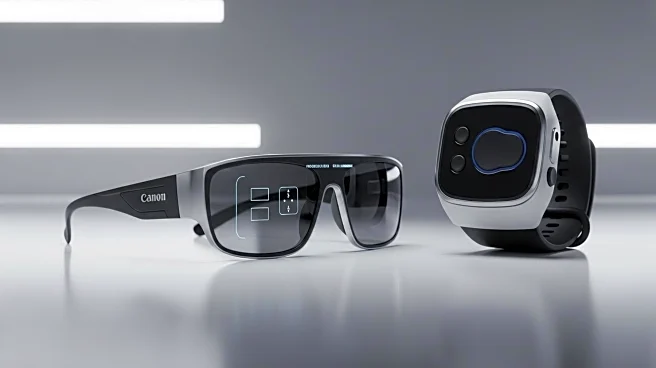What's Happening?
Meta has launched the Ray-Ban Display, a new consumer smart glasses model priced at $799, set to ship on September 30, 2025. This product marks Meta's first major push into the mass-market for display-equipped smart glasses, integrating AI technology into everyday use. The glasses come with a wristband controller and feature Meta's AI assistant. Despite the ambitious launch, onstage demonstrations revealed glitches, raising questions about consumer adoption. The product aims to enhance user experience by offering smarter vision through AI integration, but the initial technical issues have led to skepticism among potential buyers.
Why It's Important?
The introduction of the Ray-Ban Display glasses represents a significant step in the evolution of wearable technology, potentially shifting consumer preferences from traditional devices to AI-enhanced wearables. The $799 price point and inclusion of a wristband controller suggest Meta is targeting a broad consumer base rather than niche developers. This launch could influence the trajectory of the AR/VR market, which IDC forecasts to reach 14.3 million shipments in 2025. Success hinges on the reliability of software and gesture controls, which could transform wearables from novelty items to essential tools, impacting competitors like Amazon and Snap.
What's Next?
Meta's Ray-Ban Display glasses are entering the market during the holiday buying season, which could drive early adoption if the product proves reliable. The company is likely to focus on addressing the software glitches highlighted during the demo to build consumer trust. Rapid firmware updates and developer attention on compact AR UI are expected, along with the development of accessory markets around the wristband. The success of this launch will depend on consumer acceptance of AI services and the practical utility of the glasses in daily life.
Beyond the Headlines
The launch of the Ray-Ban Display glasses could have broader implications for privacy and user experience in wearable technology. As consumers weigh the benefits of hands-free AI prompts against potential privacy concerns, Meta's approach to data security and user control will be critical. The product's success may also influence the development of future AR applications, encouraging innovation in compact UI design and integration of AI into everyday tasks.









